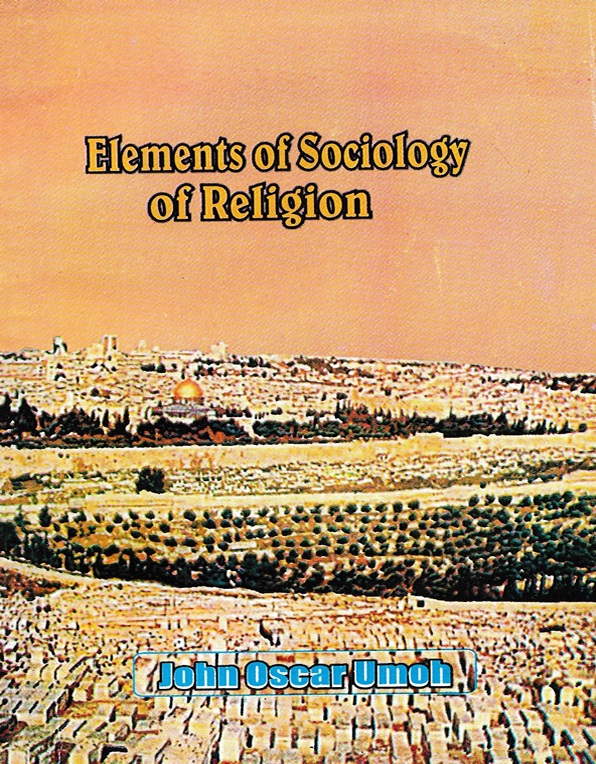Description
ABOUT
Elements of Sociology of Religion is a study manual on religion as a social institution. Affirming the importance of the religious institution in all human societies in all generations/ages, the book examines the dynamic
relationship between religion and the human society and the influence of each on the other. The brief historical analysis of religion in Nigeria shades some light on the advent of foreign religion and their contact with the
indigenous religions in the unfolding scenario of the colonial administration. The usefulness of the text to
students is further strengthened by the addition of a separate chapter with a summary, some useful exercises and
projects for more academic exploration and intellectual stimulation.
PREFACE
Knowledge of social institutions forms a major part of undergraduate curricula in sociology. Family organization,
Political and Economic Institutions, among the major ones, have continued to receive priority attention in the
structure of the programmes for beginners for their future career. The result of this is that students have sufficient access in those areas of reference and introductory materials on which to build a solid foundation for higher academic pursuit in those aspects of the social sciences. With the abundance of texts in those areas, students not only have access to reference materials, but they also have their desires kindled for their future professional growth. The situation is not quite as encouraging in regard to the sociology of religion even when religion is seen as a primary institution in all societies. Not only are scholars few who have a genuine interest in the development of the field, but its not being very amenable to the scientific methodology truly discourages many. This
attitude can be understandable but not excusable. It is understandable because the history of the development of science seems to emphasize that the real understanding i of the facts of nature began when philosophical (speculative) methods were abandoned in the 17th century in favour of the positivistic methods of the natural sciences especially physics and chemistry. The inclination on the other hand to be unduly attached to the scientific method is not excusable because science borrows its presuppositions from pre-scientific and common experience without which there is no foundation. Therefore, pre-scientific, speculative knowledge has an important bearing to modern scientific knowledge (Umoh, 1998). With the paucity of supportive reading materials and scholarly research output
the beginner has difficulty seeing the sociology of religion as a fascinating sub-discipline within sociology in which he can make a career.
The present attempt is meant as a useful reading material and a “vade mecum” handbook, for the beginner in
sociology who might consider deepening his interest in, and making a career of, the sub area of the sociology of religion. It considers the religious phenomenon not only as a social institution in its own right but also in its ability to exert an enormous amount of influence on other social institutions the family, politics, the economy
and the educational institutions.
This book is an answer to an invitation. It is inspired by the students’ deep and sincere demand for a reference text that can help them towards a better understanding and appreciation of the concepts and ideas in the area of the
sociology of religion. Given the readership target, it is written in simple and clear language without the usual sociology jargons that obscure rather than explain the issues at hand. I thank the undergraduate students
of the University of Uyo for the challenge through which the present copy is born.
J. O. UMOH (PH. D)
Department of Sociology/Anthropology
University of Uyo
TABLE OF CONTENT
CHAPTER ONE: INTRODUCTION
- The meaning of Sociology of Religion
- Why the study of the Sociology of Religion
- Approaches to the Scientific Study of Religion
- Tolemism: A Primitive Religion
CHAPTER TWO: BASIC ELEMENTS OF RELIGION
- Basic Concepts used in Religion Discussions
- Religious Organization and Behaviour
- The Church
- The Denomination
- Sects
- Cults
- Conclusion
CHAPTER THREE: RELIGION AND SOCIETY
- Emile Durkheim: Religion and Common Morality
- The Functions of Religion: A Contemporary View
- Max Weber: Religion and Social Change
- Analysis of the Protestant Ethic
- Weber’s Iron Cage
- Karl Marx: Religion as Opium
CHAPTER FOUR: RELIGION AND SCIENCE
- The position of Sociology of Religion
- Religion and Education
- Religion and Economics
- Religion and Politics
- Religion and the Family
- Conclusion
CHAPTER FIVE: GENERAL POSTULATES ON RELIGION
- The Postulate of Representation
- The Postulate of Unity and Integration
- The Postulate of Social Control
- The Postulate of Alienation
- The Postulate of Relativism
- The Postulate of Social Change
CHAPTER SIX: MODERN TRENDS IN RELIGIOUS BEHAVIOUR
- Institutionalization
- Religious Pluralism
- Secularization
- Fundamentalism
- Religiosity
- Unofficial Religion
CHAPTER SEVEN: RELIGIOUS FANATICISM
- Types of Religious Fanaticism
- Causes of Religious Fanaticism
CHAPTER EIGHT: AFRICAN TRADITIONAL RELIGION
- Major Contents of African Traditional Religion
- Indigenous and Foreign Religions: Differences and Similarities
- Summary
CHAPTER NINE: RELIGION AND THE NIGERIAN SITUATION
- The rise of African Independent Churches
CHAPTER TEN: WORLD RELIGIONS
- Christianity
- Islam
- Hinduism
- Judaism
- Buddhism
- Confucianism
CHAPTER ELEVEN: Religion and Feminism
CHAPTER TWELVE: Religion, Feminism and Women Liberation
CHAPTER THIRTEEN
- Religion and Rational Worldview
- Introduction
- The Interaction between Traditional Religion, Christianity and Islam
- African Traditional Philosophy and Worldview
- Impact of Modernization on Traditional Religion
- Impact of Modernization on Christianity
- Impact of Modernization on Islam
- Conclusion
CHAPTER FOURTEEN PUTTING IT TOGETHER
- Summary
- Critical Thinking Questions
- Multiple Choice Questions
- True-False Questions
- Questions for Discussion
- Projects
- Bibliography
Questions and Answers
You are not logged in

